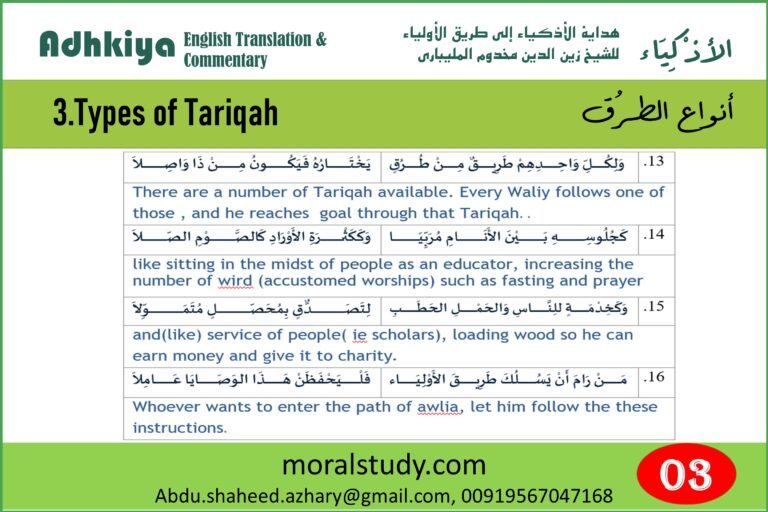Every Waliy has his own way of adopting Tariqah. It is not restricted to reciting any Dhikr or following a specific Sheikh. There are many ways to follow; some people prefer one way while others prefer a different way. The author provided us with some popular examples.
1. The first example given here is to work as an instructor, teacher, and lecturer or in any kind of educational field giving clear instructions to the ways of Allah along with controlling his movements and activities.
2. The second example is engaging himself in the worship of Allah like performing Salaat (prayer) or Sawm (fasting). He has to do them in large quantities.
3. The third example is serving the people. The word people refers to religious scholars and Sufis.
4. The fourth example is working hard to earn some money to feed the poor and destitute. He carries the wood from the forest to make firewood and sells it at the market. Then he spends for charity the money he earned.
So far, we have studied eleven lines. These eleven lines are considered the preface of the book. The entire book is designed for those who want to succeed in the next world. One has to prepare himself to achieve this goal. The first step is to keep his inner feelings and thoughts clear of any kind of dirt and vices. The easiest way to do so is to adopt the pious Muslim (Sheikh) as his master, and obey his commands and rulings.
Here comes the complexity of such a way. As per Islamic belief, only prophets are infallible. Without a doubt, the prophet Muhammad r is infallible and unerring. Therefore, the best way to attain success in the hereafter is to identify a Sheikh who strictly follows the Prophet Muhammad r and applies the Sharia .
One who is a veteran of Sharia is called Faqeeh, or jurist. Hundreds of books were compiled explaining different aspects of Fiqh. Four major schools of thought formed throughout Islamic history under the name Madhhab. They included Hanafi, Shafi, Maliki, and Hanbali. The detailed study of Madhhab is beyond the scope of this book.
According to the author, only Faqeeh (jurist) is entitled to be a Sheikh. His knowledge of Fiqh should be applied practically throughout his life. Tariqah is meant to be an easy way to enforce and apply the knowledge of Fiqh in his life. Eventually he may reach Haqiqah, the core of Tasawwuf . One of the major misconceptions about Tariqah is that it is a shortcut way towards Allah, without giving much importance to Fiqh rules. In fact, Tariqah is the shortcut to applying Sharia in practical life.
What is Tariqah? Popular thought is that it is following a sheikh and obeying his rules and commands. The author comes up with a different idea. Tariqah can sometimes be as simple as educating people, serving them, increasing prayer and fasting and so on.
Haqiqah is not easy to catch. If hard work is the pre-requisite of Tariqah, the special care and Tawfeeq from Allah is a prerequisite of Haqiqah. It is hard to dive into the sea and discover pearls in the depths of the ocean. Even a hardworking and expert diver may not find the pearl.
Before entering into the core of the subject, the author indicates that this book is meant to guide anyone who wants to attain the love of Allah and reach the rank of Wilaya. One who wants to obtain this rank should be careful in adopting the instructions described in this book.
